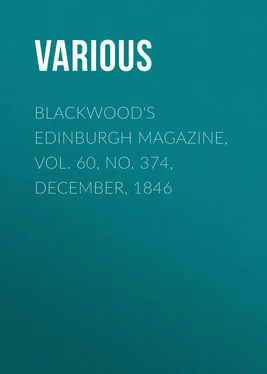Various - Blackwood's Edinburgh Magazine, Vol. 60, No. 374, December, 1846
Здесь есть возможность читать онлайн «Various - Blackwood's Edinburgh Magazine, Vol. 60, No. 374, December, 1846» — ознакомительный отрывок электронной книги совершенно бесплатно, а после прочтения отрывка купить полную версию. В некоторых случаях можно слушать аудио, скачать через торрент в формате fb2 и присутствует краткое содержание. Издательство: Иностранный паблик, Жанр: periodic, foreign_edu, Путешествия и география, на английском языке. Описание произведения, (предисловие) а так же отзывы посетителей доступны на портале библиотеки ЛибКат.
- Название:Blackwood's Edinburgh Magazine, Vol. 60, No. 374, December, 1846
- Автор:
- Издательство:Иностранный паблик
- Жанр:
- Год:неизвестен
- ISBN:нет данных
- Рейтинг книги:4 / 5. Голосов: 1
-
Избранное:Добавить в избранное
- Отзывы:
-
Ваша оценка:
- 80
- 1
- 2
- 3
- 4
- 5
Blackwood's Edinburgh Magazine, Vol. 60, No. 374, December, 1846: краткое содержание, описание и аннотация
Предлагаем к чтению аннотацию, описание, краткое содержание или предисловие (зависит от того, что написал сам автор книги «Blackwood's Edinburgh Magazine, Vol. 60, No. 374, December, 1846»). Если вы не нашли необходимую информацию о книге — напишите в комментариях, мы постараемся отыскать её.
Blackwood's Edinburgh Magazine, Vol. 60, No. 374, December, 1846 — читать онлайн ознакомительный отрывок
Ниже представлен текст книги, разбитый по страницам. Система сохранения места последней прочитанной страницы, позволяет с удобством читать онлайн бесплатно книгу «Blackwood's Edinburgh Magazine, Vol. 60, No. 374, December, 1846», без необходимости каждый раз заново искать на чём Вы остановились. Поставьте закладку, и сможете в любой момент перейти на страницу, на которой закончили чтение.
Интервал:
Закладка:
During their long period of practical independence and freedom, the Ditmarschers governed themselves like stanch republicans. Their grand assembly was the Meende , to which all citizens were eligible above the age of eighteen. It met in extraordinary cases at Meldorf, the capital: but commonly seventy or eighty Radgewere , or councillors, decided upon all questions of national policy propounded to them by the Schlüter , or overseers of the various parishes into which the district was divided, who generally managed the affairs of their own little municipality independently of their neighbours. This simple institution underwent some modifications about the middle of the fifteenth century, when, in consequence of internal dissensions, eight-and-forty men were chosen as supreme judges for life. These " achtundveertig " had, however, but little real power. They met weekly; but on great emergencies they summoned a general assembly, amounting to about 1500 persons, and consisting of the various councillors and schlüter . This assembly held forth in the market-place of the capital. The masses closely watched the proceedings, and when it was deemed necessary, called upon one of their own number to address the meeting on behalf of the rest.
The peace enjoyed by the Ditmarschers from without, contrasted strongly with the tumults that were often experienced within. The annals of these people inform us, that whole families and races were from time to time swept away by the hand of the foe, and by the violence of party spirit. The Ditmarschers celebrate several days as anniversaries of victories. One, the Hare day, dates as far back as 1288, when a party of Holsteiners made an incursion into the marshes, but were speedily opposed by the natives. For a time the two hostile bands watched each other, neither willing to attack, when a hare suddenly started up between them. Some of the Ditmarschers, pursuing the frightened animal, exclaimed Löp, löp! – "Run, run!" The foremost Holsteiners, seeing the enemy approaching at full speed, were thrown into confusion; whilst those behind them, hearing the cry of "run, run!" took to their heels, and a general rout ensued. The day of "melting lead" is another joyful anniversary. Gerard VII. of Holstein, endeavouring in 1390 1 1 Mr Kohl fixes the date of the "melted lead" day at 1319, forgetting that Margaret, the Semiramis of the North, in whose reign the event occurred, did not reign in Denmark until about 1375. She died in 1412.
to subjugate the country of the Ditmarschen, drove the people at the crisis of an assault to such extremities, that they were obliged to take refuge in a church, which they obstinately defended against the Duke's troops, until Gerard, infuriated, ordered the leaden roof of the building to be heated. The melted lead trickled down on the heads of the Ditmarschers, who, finding themselves reduced to a choice of deaths, desperately fought their way out, engaged the Holsteiners, whom they overcame, and who, ignorant of the country, were either lost in the intricacies of the marshes or drowned in the dikes. The forces of a count, a duke, and a king, were in turns routed by the brave Ditmarschers, who have not yet forgotten the glory of their ancient peasantry. In 1559, however, they ceased to gain victories for celebration. In that year Denmark and the Duchies united to subdue the small but very valiant nation. They marshalled an army of twenty-five thousand picked men, whilst the Ditmarschers could with difficulty collect seven thousand. John Rantzan commanded the allied army. He captured Meldorf, set fire to the town, pursued the inhabitants in all directions and destroyed the greater number whilst they were nobly fighting for their liberties. Utterly beaten, the Ditmarschers submitted to their conquerors. Three of the clergy proceeded to the enemy, bearing a letter addressed to the princes as "The Lords of Ditmarschen," and offering to surrender their arms and ammunitions, together with all the trophies they had ever won. A general capitulation followed: not wholly to the disadvantage of the people, since it was stipulated that none but a native of the country should hold immediate authority over it. At first the land was divided amongst the sovereigns of Denmark, Holstein, and Sleswig; but in 1773 it was finally ceded in full to the Danish monarch, together with part of Holstein, by the Duke of Schleswig-Holstein, (afterwards Grand-Duke of Russia,) in exchange for Oldenburg and Delmenhorst. The Ditmarschers, at the present hour enjoy many of their former privileges: they acknowledge no distinctions of rank; they have their forty-eight Supreme Judges (the ancient schlüter ) under the name of Vögte or overseers, and may, in fact, be regarded as one of the best samples of republicanism now existing in the world.
Thus much for their history. Of their far-farmed dikes and sluices, of the marsh-lands and downs which their embankments inclosed, much more may be said, for Mr Kohl devotes half his work to their consideration. We will not fatigue the indulgent reader by engaging him for a survey. The land is distinguished by the inhabitants by the terms grest and marsch ; the former being the hilly district, the latter the deposits from the sea: – the one is woody in parts, having heath and sand, springs and brooks: the other is flat, treeless, heathless, with no sand or spring, but one rich series of meadows, intersected in every direction by canals and dikes. Far as the eye can reach, it rests upon broad and fertile meads covered with grazing cattle; whilst from the teeming plain stand forth farm-houses innumerable, raised upon wurten , or little hillocks, some ten or twelve feet above the level of the land, for security against constantly recurring inundation. All external appliances needful for the establishment are elevated upon these heights, whose sides are, for the most part, covered with vegetable gardens, and here and there with flowers and shrubs. The houses have but one story; they are long, and built of brick. For protection against the unsteady soil, they are often supported by large iron posts projecting from the sides, and looking like huge anchors. There are few villages or hamlets in the marshes. The inhabitants are not gregarious, but prefer the independence of a perfectly insulated abode. The "threshold right" is still so strictly maintained amongst them, that no officer of police dare enter, unpermitted, the house of a Ditmarscher, or arrest him within his own doors.
The roads in the marshes, as may be supposed, are, at times, almost impassable; riding is therefore more frequent than driving or walking, although many of the more active marshers accelerate their passage across the fens by leaping-poles, which they employ with wonderful dexterity. The women ride always behind the men, on a seat fastened to the crupper. As the dikes lie higher than the meadows, they prove the driest road for carriages and passengers; but they are not always open to the traveller, lest too constant a traffic should injure the foundations. The carriages chiefly used are a species of land canoe. They are called Körwagen , and are long, narrow, and awkward. On either side of the vehicle, chairs or seats swing loosely. No one chair is large enough for the two who occupy it, and who sit with their knees closely pressed against the seat which is before them.
Читать дальшеИнтервал:
Закладка:
Похожие книги на «Blackwood's Edinburgh Magazine, Vol. 60, No. 374, December, 1846»
Представляем Вашему вниманию похожие книги на «Blackwood's Edinburgh Magazine, Vol. 60, No. 374, December, 1846» списком для выбора. Мы отобрали схожую по названию и смыслу литературу в надежде предоставить читателям больше вариантов отыскать новые, интересные, ещё непрочитанные произведения.
Обсуждение, отзывы о книге «Blackwood's Edinburgh Magazine, Vol. 60, No. 374, December, 1846» и просто собственные мнения читателей. Оставьте ваши комментарии, напишите, что Вы думаете о произведении, его смысле или главных героях. Укажите что конкретно понравилось, а что нет, и почему Вы так считаете.












